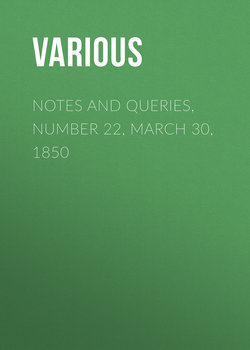Читать книгу Notes and Queries, Number 22, March 30, 1850 - Various - Страница 2
NOTES
PROVERBIAL SAYINGS AND THEIR ORIGINS—PLAGIARISMS AND PARALLEL PASSAGES
Оглавление"Ον οι Θεοι φιλουσιν αποθνησκει νεοσ."
Brunck, Poëtæ Gnomici, p. 231., quoted by Gibbon, Decl. and Fall (Milman. Lond. 1838. 8vo.), xii. 355. (note 65.)
"Quem Jupiter vult perdere, priùs dementat."
These words are Barnes's translation of the following fragment of Euripides, which is the 25th in Barnes' ed. (see Gent.'s Mag., July, 1847, p. 19, note):—
"Οταν δε Δαιμων ανδρι πορσυνη κακα,
Τον νουν εξλαψε προτον."
This, or a similar passage, may have been employed proverbially in the time of Sophocles. See l. 632. et seq. of the Antigone (ed. Johnson. Londini. 1758. 8vo.); on which passage there is the following scholium:—
"Μετα σοφιασ γαρ υπο τινοσ αοιδιμου κλεινον εποσ πεφανται,
Οταν δ' ο δαιμων ανδρι πορσυνη κακα,
Τον νουν εξλαψε προτον ω βουλευεtai.
Respecting the lines referred to in the Chorus, Dr. Donaldson makes the following remarks, in his critical edition of the Antigone, published in 1848:—
"The parallel passages for this adage are fully given by Ruhnken on Velleius Paterculus, ii. 57. (265, 256.), and by Wyttenbach on Plutarch, De Audiendis Poetis, p. 17. B. (pp. 190, 191.)"
"Music hath charms to soothe a savage breast,
To soften rocks, or bend a knotted oak."
Congreve's Mourning Bride, act i. sc. i. l. 1.
"L'appetit vient en mangeant."
Rabelais, Gargantua, Liv. i. chap. 5. (vol. i. p. 136, ed. Variorum. Paris, 1823. 8vo.)
This proverb had been previously used by Amyot, and probably also by Jerome le (or de) Hangest, who was a Doctor of the Sorbonne, and adversary of Luther, and who died in 1538.—Ibid. p. 136 (note 49.).
I know not how old may be "to put the cart before the horse." Rabelais (i. 227.) has—
"Il mettoyt la charrette devant les beufz."
"If the sky falls, we shall catch larks."
Rabelais (i. 229, 230.):—
"Si les nues tomboyent, esperoyt prendre alouettes."
"Good nature and good sense must ever join;
To err is human, to forgive divine."
Pope's Essay on Criticism, pp. 524, 525.
"Nay, fly to altars, there they'll talk you dead;
For fools rush in where angels fear to tread."
Ib. pp. 624, 625.
The Emperor Alexander of Russia is said to have declared himself "un accident heureux." The expression occurs in Mad. de Staël's Allemagne, § xvi.:—
"Mais quand dans un état social le bonbeur lui-même n'est, pour ainsi dire, qu'un accident heureux … le patriotisme a peu de persévérance."
Gibbon, Decl. and Fall (Lond. 1838. 8vo.), i. 134.:—
"His (T. Antoninus Pius') reign is marked by the rare advantage of furnishing very few materíals for history; which is indeed little more than the register of the crimes, follies, and misfortunes of mankind."
Gibbon's first volume was published in 1776, and Voltaire's Ingenii in 1767. In the latter we find—
"En effet, l'historie n'est que le tableau des crimes et des malheurs."—Oeuvres de Voltaire (ed. Beuchot. Paris, 1884. 8vo.), tom. xxxiii. p. 427.
Gibbon, vol. ix. p. 94.:—
"In every deed of mischief, he (Andronicus Comnenus) had a heart to resolve, a head to contrive, and a hand to execute."
Cf. Voltaire, "Siècle de Louis XV." (Oeuvres, xxi. p. 67.):—
"Il (le Chevalier de Belle-Isle) était capable de tout imaginer, de tout arranger, et de tout faire."
"Guerre aux chateaux, paix à la chaumière,"
ascribed to Condorcet, in Edin. Rev. April, 1800. p. 240. (note*)
By Thiers (Hist. de la Rév. Franç. Par. 1846. 8vo. ii. 283.), these words are attributed to Cambon; while, in Lamartine's Hist. des Girondins (Par. 1847. 8vo.), Merlin is represented to have exclaimed in the Assembly, "Déclarez la guerre aux rois et la paix aux nations."
Macaulay's Hist. of England (1st ed.), ii. 476:—
"But the iron stoicism of William never gave way: and he stood among his weeping friends calm and austere, as if he had been about to leave them only for a short visit to his hunting-grounds at Loo."
"… non alitèr tamen
Dimovit obstantes propinquos,
Et populum reditus morantem,
Quàm si clientum longa negotia
Dijudicatâ lite relinqueret,
Tendens Venafranos in agros,
Aut Lacedæmonium Tarentum."
Hor. Od. iii. v. 50-56.
"De meretrice puta quòd sit sua filia puta,
Nam sequitur levitèr filia matris iter."
These lines are said by Ménage (Menagiana, Amstm. 1713. 18mo., iii. 12mo.) to exist in a Commentary "In composita verborum Joannis de Galandiâ."
F.C.B.
